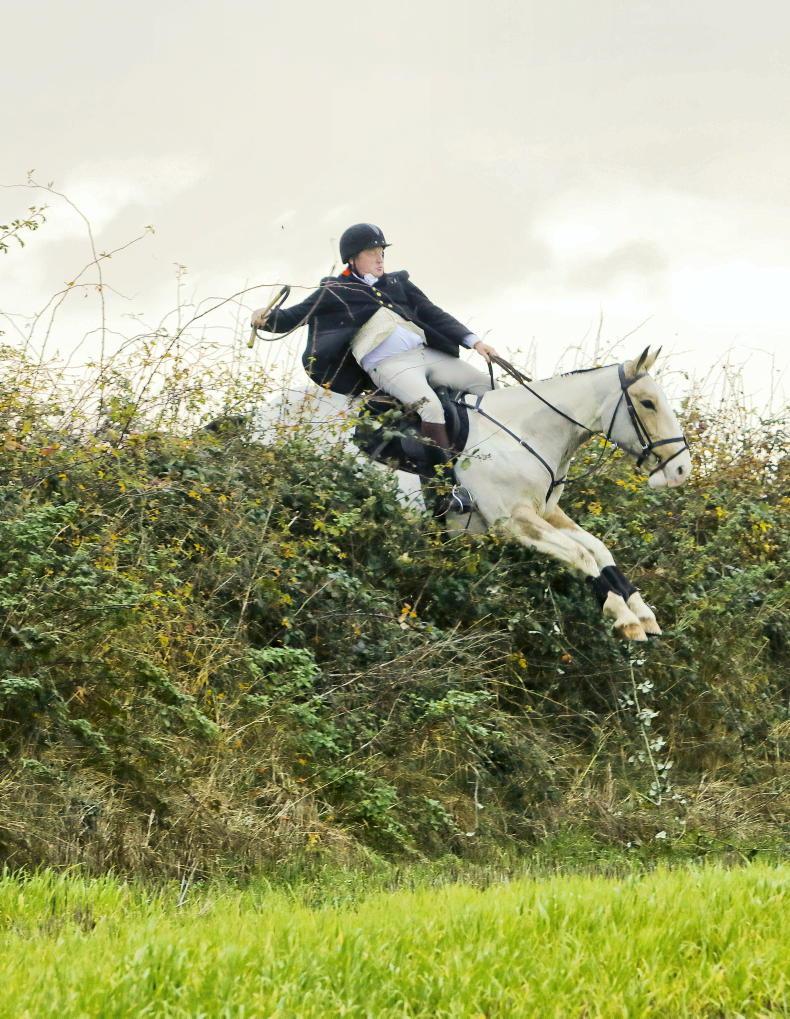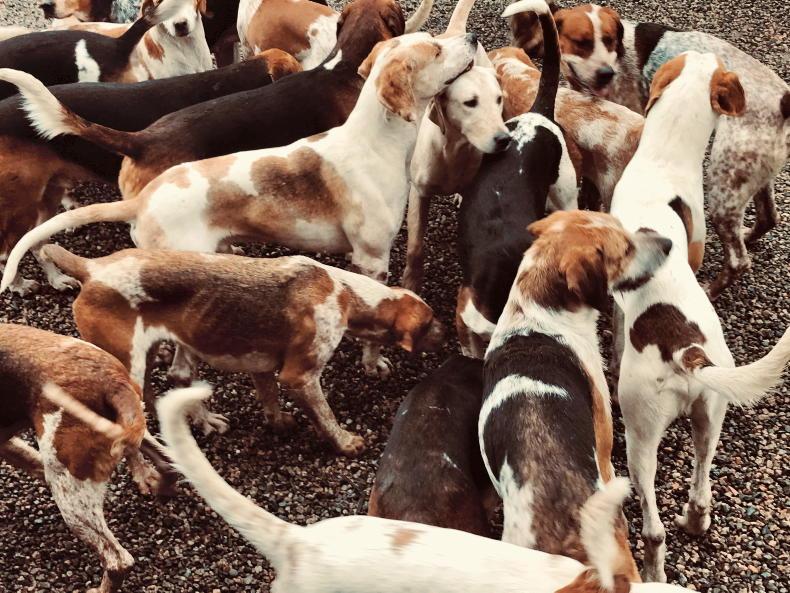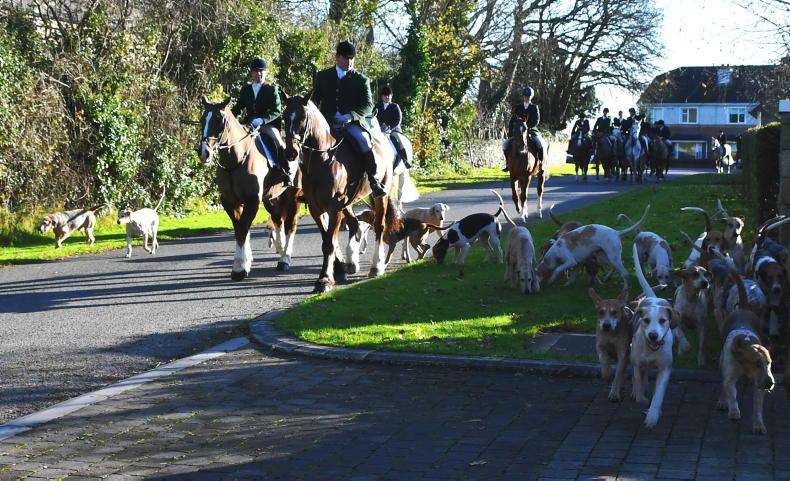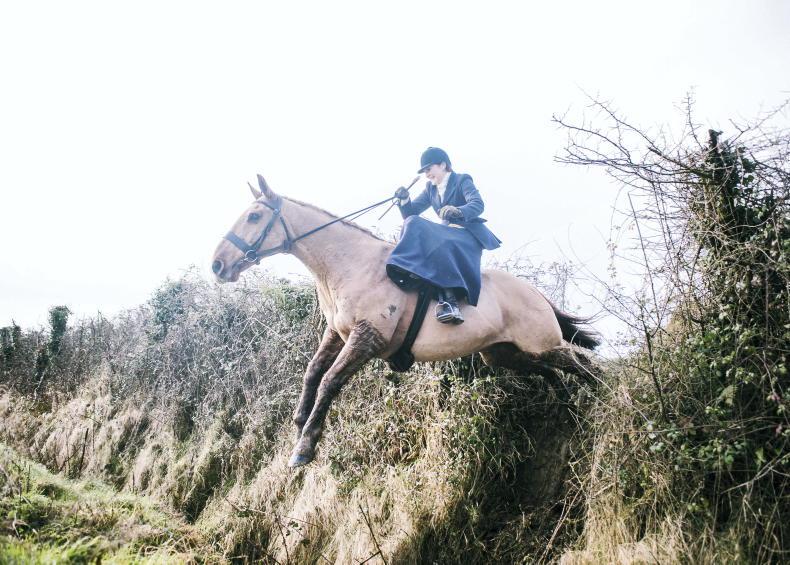THE prerequisites for any horse to hit the hunt whether bred for it or not, are an ability to clear hedges and ditches, be tough enough to weather the drop-landings and clever enough to master all terrains. The horse also needs the stamina to handle an entire hunting season from October to March.
The truth is, to witness a hunt today is to watch every shape and size of animal thunder by with the hope of finishing an exciting day with nothing but mud splashes and the odd bit of whitethorn in the tail. According to the Hunting Association of Ireland: “As many as 300,000 people from every walk of life participate in some form of the sport in Ireland.”
Tough trails can ask a lot of our mighty hunters, whether bred for the sport from the best hunter bloodlines, or transitioned from another discipline, the demands on these animals are all the same as they fly across the landscape, traversing ditch and conquering fences.
These horses are our valued athletic partners in sport, and the least we can do is give them all the support we can to help them face the many challenges we set them in a season.
Muscle health
For those looking to buy a hunter, the best time is never at the beginning of the season; it could be argued the smart money is on the horse who stayed sound and came out on top at the end of the five months. In my time as an equine therapist, I can count on one hand the number of hunt horses I treated compared to show jumpers, eventers and racehorses.

For the hunter, muscle health and fitness is often overlooked as part of the daily regime, but it is paramount in supporting the ability to finish the season in equal or finer form than when beginning it.
Hunting can be a practical foundation for young show jumpers and eventers as well as seasoned hunt horses. The hunt can add an inherent resilience and level of experience which can stand them for the rest of their lives, if done right.
For all the talk of a ‘head like a duchess, hind like a cook’, the perfect hunt horse need not be pretty; the perfect hunt horse should first and foremost be healthy and sound. A horse for hunting also requires the all-important honest nature and astute, but not over-competitive, mind.
The challenges of hunting demand optimum wellbeing addressed through correct feeding, attention to muscle health and appropriate preparation of fitness levels. According to veterinary surgeon Darley Matheson in his classic 1921 book, The Horse in Health, Accident and Disease, “Condition is seldom bought. It has to be made.”
Fitness is at the heart of a hunt horse’s ability to perform. Conditioning can involve months of measured hard surface work in walk and trot, plus correct canter and gallop work to follow.
There are many instructors out there, both in-person and online, who can guide you to an appropriate programme to help your horse prepare for the hunting season and come out of it sound. Another pre-season specialist to consult should be a saddle fitter who can help with any tack issues. Also of course, the farrier should play a central role pre-season and right through the hunting months.
With the sweat, mud, long days and condition fluctuations of an entire season of hunting, even the tiniest tack fit problem will cause issues such as stress points, abrasions and often quite significant pain for the horse.
Horses must rest to rebuild. The importance of days off for muscle recovery cannot be over-stressed.
Rest days don’t mean standing in a stable as this can cause stiffness - turn-out or gentle walking exercise is the perfect rest day.
Tying up is a more serious muscle condition and isn’t uncommon in hunters; it is widely believed however that tying up stems from excessive exercise: over-work combined with under-training resulting in glycogen build-ups within muscles.
Vitamins and minerals
Regarding feeding the hunter, the particular sustained work they do requires slow-release energy. Energy levels must be maintained without blowing the head.
The usual recommendations for this type of work are a good quality forage diet with small amounts of hard feed and a splash of oil. Forage can easily be tested to see just what it may or may not be lacking so that you can supplement accordingly and not blindly.
A good quality balancer is often all that’s needed to allow your hunter the required vitamins and minerals, plus salt if he is working heavily and sweating a lot.
Any feed company nutritionist will be able to advise you on a bespoke programme for your hunt horse. Regular visits by a qualified equine dental technician are vital too and will ensure that your horse can chew food effectively for maximum nutritional benefit.
A standard worm count and appropriate worming regime will go a long way to keeping things right too.
Warm-ups
Warm-up and cool-down are as essential for the hunt horse just as they are for any other equine discipline. Correct warm-up and cool-down will prepare the muscles for the strenuous task ahead and return all the levels within normal range, lessening the risk of muscles becoming damaged during the hunt, or stiff afterwards.
There are many demands on the musculoskeletal system of the horse while hunting, mainly due to the uncertain nature of the adverse terrain they cross, including hard tarmac and soft, deep mud.
Work at pace on hard tarmac also puts pressure on the lower limbs, which travels up the leg into the supporting muscles, acting as shock absorbers. Because of this sort of pressure, hunters often have varying levels of tension in the shoulder and chest.
As we all know, muddy conditions take a toll on any horse, and for the hunter, in particular, deep mud can cause the hindquarter muscles to strain or tear the muscle fibres and it can put real pressure on tendons and ligaments.


 This is a subscriber-only article
This is a subscriber-only article
 It looks like you're browsing in private mode
It looks like you're browsing in private mode











SHARING OPTIONS: